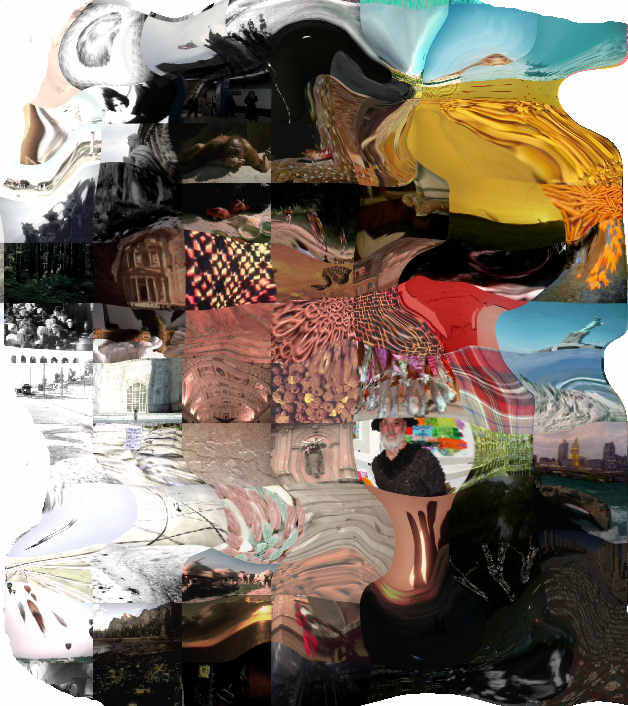|
Rules for Those Who Almost Never
Follow

-
When breaking new ground, listen
to everyone but follow no one.
The problem of being a cultural
leader is that you must set your own path with little or no help
from others.
-
When in doubt, circle the
wagons. In the
history of settlers in America, when they were attacked or had
problems that they could not solve they circled the covered
wagons and looked out upon a hostile world. It is the same with
any problem. You start with self and move out to the universe.
-
Luck comes to those who are
prepared. You never
know what you might need so it is best to prepare multiple ways
to solve or approach anything.
-
If they give you lined paper,
write (but across the lines if they do not tell you
differently). Leaders
are rebels who push the rules of a society and yet somehow stay
within some guidelines or rewrite the rules for what the
guidelines are.
-
Walking on new ground, tread
softly at first and hold the hand of a friendly, experienced
partner. Even though
the path that you might take as a leader is new, there are those
who have walked other paths who can help with small hints of how
to trend.
-
Stop and watch the grass grow.
You might learn something. Leaders tend to see the world
from a satellite point of view. It is important to stop this at
times to see from a close up point of view.
-
First you shoot the arrows and
then you paint the targets.
You cannot miss. Try an idea and see if it works. If it
does, build something around it: a system, a product, a nation,
an idea or an image.
-
When walking in the unknown, any
path will do. You can
begin in the middle, work backwards or forwards. If you do not
know where you are going, any road will get you there. A
cultural leader must embrace risk as a way of life. Creative
thinking is not a linear process.
-
For a creative human being, it
is just as important to forget as to remember.
When building a new house, it is important to forget the
frustrations of building the first one, without losing that data
somewhere.
-
Leave the door open since the
future is sometimes the past.
When creating something new, many cultural leaders go to the
past for inspiration but not the immediate past: for instance,
when thinking about 2003, go to the 1960s.
-
May the beauty we love be what
we do. If you do not
create what you love, the outcome will be something that you or
others cannot live with. Also remember that creating truth is
beauty.
-
When you say, “My door is always
open,” remember that you can go out as well as
inviting others to come in.
When making a major
change in what system is used or the outward appearance of the old
system, go out and talk with those most closely effected.
-
When you are in a foreign place,
remember that you are the foreigner.
Also
keep in mind that anything or anyone
or anyplace outside yourself is a foreign land.
-
When you are playing marbles
with someone and you win all their marbles, give
back some marbles so that you
have someone to play with tomorrow.
This is a lesson learned from a
capitalist with a conscience who made millions in business but
always gave back to his world and community. As he recently pointed
out, “If too few have too much and too many have too little, we do
not have a sustainable society.”
-
When steel is placed beside
gold, all becomes yellow.
This is a saying in Mongolia
that deals with two strong
personalities in a marriage but it can apply to many situations.
-
Cherish your roots.
Because of the influences around
you as you grow up, take the best
and leave the rest. You will always,
somewhat, live where you have lived.
-
Life is richer if lived broadly.
Embrace new passions,
new experiences and new vistas.
You will find that you grow as your
base of experiences grows. When moving into the unknown, remember
that if you learn to meet people and situations in life many other
areas will take care of themselves.
-
If man tells you “No”, question
it; if nature tells you “No”, listen closely.
Mankind
can figure out ways to fly to the
moon and beyond, but not jump off a building and expect to grow
wings. Freedom is learning to fly by nature’s rules.
-
Don’t be afraid to go out on the
limb. That is where the fruit is.
This is a statement by
a Texas legend in poker, Dole
Brunson, but it works for so much more in life. In fact,
Brunson’s definition of poker works
for life situations also; when he says, “Poker is a game of
incomplete information. Everyone catches luck. Good players play
people.”
-
In any creative endeavor, risk
is the business of the moment.
In the arts, those who
never take risks may not fail in
what they attempt but they never fly either. One must remember that
so-called “failure” is just another “learning experience” (therefore
it is not true failure).
“Birds fly in great sky-circles of
freedom.
How do they learn this?
They fall,
And having fallen; they are given
wings.” Rumi, 13th century Islamic poet
|

